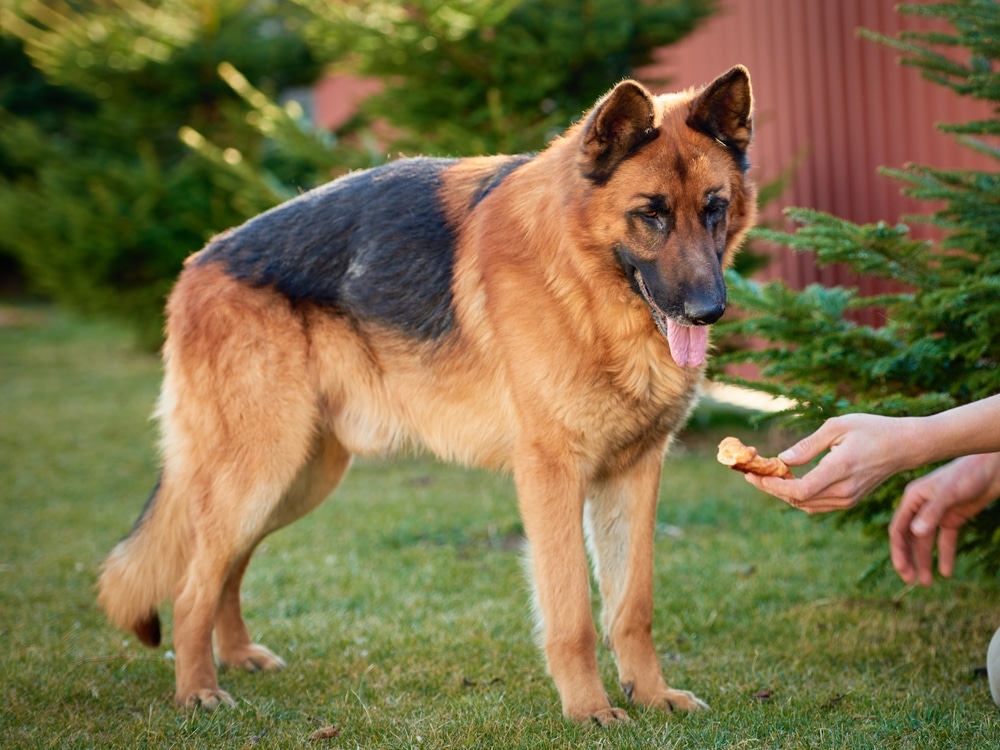Bread is one of the most beloved snacks enjoyed by humans and dogs alike. Who can resist its soft texture, delicious aroma, and the vast array of flavors? This versatile snack can be found in almost every kitchen, making it an easy choice when treating our furry friends. But can dogs eat bread?
Bread is an excellent source of carbohydrates that help to keep your dog healthy and energized. White and wheat bread are typically safe for dogs to eat in moderation. It does not cause any allergies or sensitivities. However, make sure the bread doesn’t contain too much salt or sugar and doesn’t have any ingredients that are toxic to dogs. Remember to always consult with your veterinarian prior to making any changes to your dog’s diet.
Table of Contents
What Kind Of Bread Can Dogs Eat?
Dogs can safely eat wheat and plain white bread, two of the most common types. White bread is made from refined flour, water, salt, and yeast and has a higher carb content. Wheat bread contains more nutrients like dietary fiber, vitamins, and minerals.
Whether you go for wheat or white, ensure the bread is unseasoned, without artificial flavors, preservatives, or colorings. Also, check for potential allergens that could be present, and make sure the salt and sugar content is low. Give your pup an energy boost with a slice of nutritious bread!
Benefits of Feeding Your Dog Bread

Bread is packed with carbohydrates, making it a great choice for dogs trying to gain weight or become more active. It provides many benefits, including the following.
Easy To Digest
The soft and fluffy texture of bread makes it easy for dogs to digest. The carbohydrates in bread are easy for dogs to digest.
Stimulates Appetite
Bread has a mildly appetizing smell and taste, which can help stimulate your dog’s appetite. Dogs not wanting to eat their food may be more interested in eating bread.
Relieves Constipation
Bread is a good source of fiber and can help regulate your dog’s bowel movements. It is an excellent choice for dogs who are suffering from constipation.
Calm An Upset Stomach
Bread soothes an inflamed digestive tract and can help reduce any symptoms associated with an upset stomach, such as gas or diarrhea.
Overall, bread can be a great addition to your dog’s diet. As with all snacks, it is important to feed them in moderation and only as a treat. If you have any questions or concerns about feeding your dog bread, it is best to consult with your veterinarian.
Can Dogs Eat Corn Bread Or Toast?
Dogs can eat bread, including cornbread and toast. Basic cornbread is safe for dogs to eat in small amounts as long as it does not contain any ingredients that are toxic to them. It should be made of wheat flour, milk, eggs, baking powder, salt, and sugar. Salt and sugar should be in very small amounts.
Toast can also be given to a dog in small amounts, as long as it is plain without any toppings that may be toxic. As with everything, moderation is key when feeding your pup bread products. Too much of a good thing can have negative consequences, so it’s important to give your dog only small pieces and monitor its health.
What Ingredients In Bread Are Toxic To Dogs?
The ingestion of bread by dogs can be toxic, as it may contain ingredients that are not safe for them. Common ingredients found in bread that may be hazardous to dogs include the following.
Bread With Raisins
Raisins are high in sugar and can cause kidney failure if ingested, so it is important to avoid feeding them any type of bread containing raisins.
Onions And Garlic
Garlic and onion contain thiosulfate. It can damage red blood cells in dogs and leads to anemia. Any food containing these ingredients should be avoided. Even small amounts of these ingredients can be dangerous to share with your dog.
Xylitol
Xylitol is a sugar substitute in many foods, including bread and baked goods. It can cause a drop in blood sugar levels, incoordination, liver damage, seizures, staggering, collapse, and even death if ingested by pets.
Chocolate Chips
Chocolate chips are also toxic to dogs, so it is important to avoid any bread that contains chocolate chips. Ingestion of chocolate can cause vomiting, excessive urination, diarrhea, life-threatening tremors, seizures, and heart failure.
Bread Dough
Bread dough can cause fermentation in a dog’s stomach, leading to bloating or even rupture. Ethanol toxicity from the dough is also a risk. To protect your pet, it’s best to steer clear of bread dough entirely.
Macadamia Nuts
Macadamias are a no-go for dogs and should not be fed in any form. They contain toxins that can cause weakness and pancreas inflammation if ingested. So, keep these nuts away from your pup!
Is Too Much Bread Good For Dogs?
Excessive bread intake can be detrimental to canine health. High in carbs, it can lead to weight gain if eaten in large portions, and its reduced nutritional value makes it unsuitable as a meal replacement or primary source of sustenance. Additionally, an overabundance of bread can cause digestive problems such as diarrhea or constipation.
Bread should only be given sparingly as a treat, not a daily staple; providing a balanced and nutritious diet is key to keeping your pup healthy. Moderation is paramount when it comes to bread for dogs.
Potential Risks Of Eating Bread For Dogs
Giving your pup bread as a treat is generally accepted, but it should not serve as their primary sustenance. Though it can be enjoyed in moderation, there are potential risks to consider before doing so, such as:
- Digestive issues
- Allergic reactions
- Blood sugar spikes
- Bloating and gas
- Nutrient deficiencies
- Weight gain
- Seizures and coma
- Unsteady gait
- Hypothermia
- Difficulty maintaining balance and coordination
- Experiencing weakness throughout the body
- Central nervous system depressant effects
In Conclusion: Is It Safe For Dogs To Eat Bread?
Bread can be a safe treat for your pup in moderation. However, it is important to monitor its health closely when feeding it bread and only give small pieces. You should also avoid using bread as a primary source of nutrition or replacing regular meals with it.
Furthermore, certain ingredients found in bread can be toxic to dogs, so make sure to check with your veterinarian before giving it as a treat. With their expert advice, you can give your pup the benefits of bread without any worries or risks.
